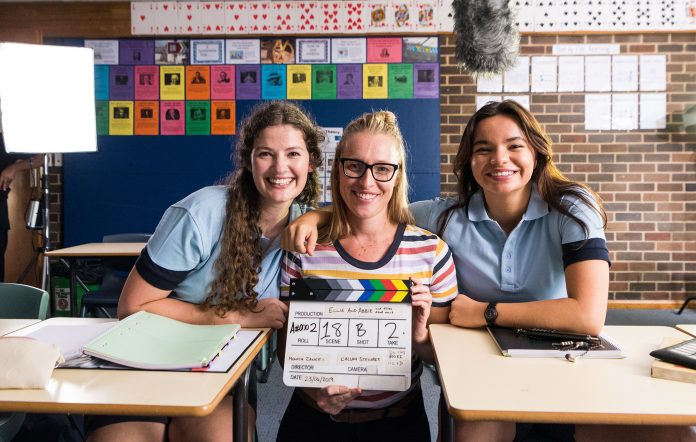
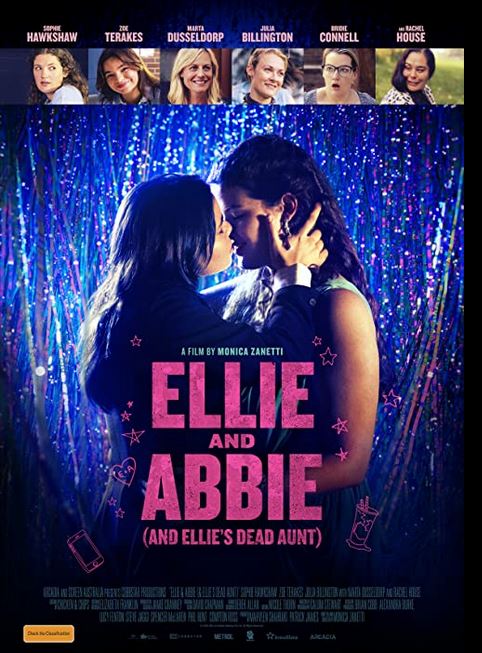
At A Glance
Ellie & Abbie (& Ellie's Dead Aunt) is a charming coming of age romcom as Ellie tries to muster the confidence to ask Abbie to the year 12 formal (prom). When her dead aunt Tara arrives in the form of her fairy godmother things go slightly awry.

Film Details
Directed by Monica Zanetti
Written by Monica Zanetti
Released by Kaleidoscope Entertainment
2021, 82 minutes, 15
In Cinemas 11th June 2021
Cast
Sophie Hawkshaw as Ellie
Zoe Terakes as Abbie
Marta Dusseldorp as Erica
Rachel House as Patty
Julia Billington as Tara
Bridie Connell as Miss Trimble
It’s never easy getting an independent film made, it takes years, passion and true tenacity to make it across the finishing line and finally present your passion project in front of an audience. One such filmmaker is writer / director Monica Zanetti. Zanetti had a vision in her mind, one that would be cast at least 50% representative of the LGBTQI+ community, she was met with some resistance, but compromise was not going to be an option as the Australian director was committed to delivering the film she wanted to make. Interviewing filmmakers like Zanetti really make me tick, so it was a true delight to sit down and share some laughs as we talk about her charming teenage romcom Ellie & Abbie (& Ellie's Dead Aunt).
It’s the obvious question, but what was the genesis of the story and why did you want to tell it?

There’s a few genesis, I have always loved romcoms, I’m a big romcom fan and I always found that I could go to the cinema to see any romcom with my Mom, it was something that we would do together, it was a very easy thing to do. But when it came to queer cinema or LGBT cinema that I really loved that always seemed to be something I had to watch by myself in my bedroom, it was always like a secret thing, it was never a thing that I could take to a sleep over or anything like that. I really wanted to make a queer family film, a film that could sit in a family category that was very important to me. So there was that aspect to it, and you know thinking a lot about how lucky I had been in my life and to have loving parents and be very accepting. But someone like my uncle who the film is dedicated to, had a very different experience to me. He had a much harder experience than I did, so I wanted to write a fun romcom about these two girls and I can’t do that without acknowledging where it came from. Like, why I can write this fun romcom is because of people like my uncle who came before me and so those were the two big genesis ideas for it.
It is very much a coming of age story, but the themes are universal aren’t they? If you are a teenager finding your feet about who you are, who you like, what your persuasions are.
Yeah I’d like to think it’s universal. I think there’s nothing more excruciating than liking someone and not knowing if they like you. It’s the single most painful feeling I think in the world, and so I think anyone watching that could relate to that feeling at some point in their life. And also high school is just horrific (laughs). So relating to that as well.
What I like about the film is that it starts very light, not fluffy, but it is very light and then as the film progresses tonally it changes, it becomes more darker and like you say we start to see themes that are far more complicated. Can you tell us a little bit more about that and the writing process?
Yeah I’m a big darkness in comedy kind of person, I think it is a very human thing to experience to laugh in dark moments, and also to experience sad moments that are meant to be in times of joy. We are so multi faceting and our emotions change so quickly, so I generally like to write in that tone, I find it very hard to write anything that is just like a drama. Like hard core drama, I would really struggle, I need to throw a joke in there. But I wanted audiences to go on the journey that Ellie was going on, that she was experiencing these feelings and in this state of euphoria and then learned some information, without giving too much away that completely breaks her heart and I wanted us, the audience to experience that with her. And it’s one of my favourite things about the film is when suddenly when people get kinda punched in the guts (laughs) and cry when they realise they were gonna cry. Like all that kind of stuff I think that’s a really wonderful thing because people are going on a journey and that’s what you want, you want people to experience things and go with it and go with the characters and so I think both aspects to it are very important. It’s very important to laugh and it’s very important to cry, just in life.
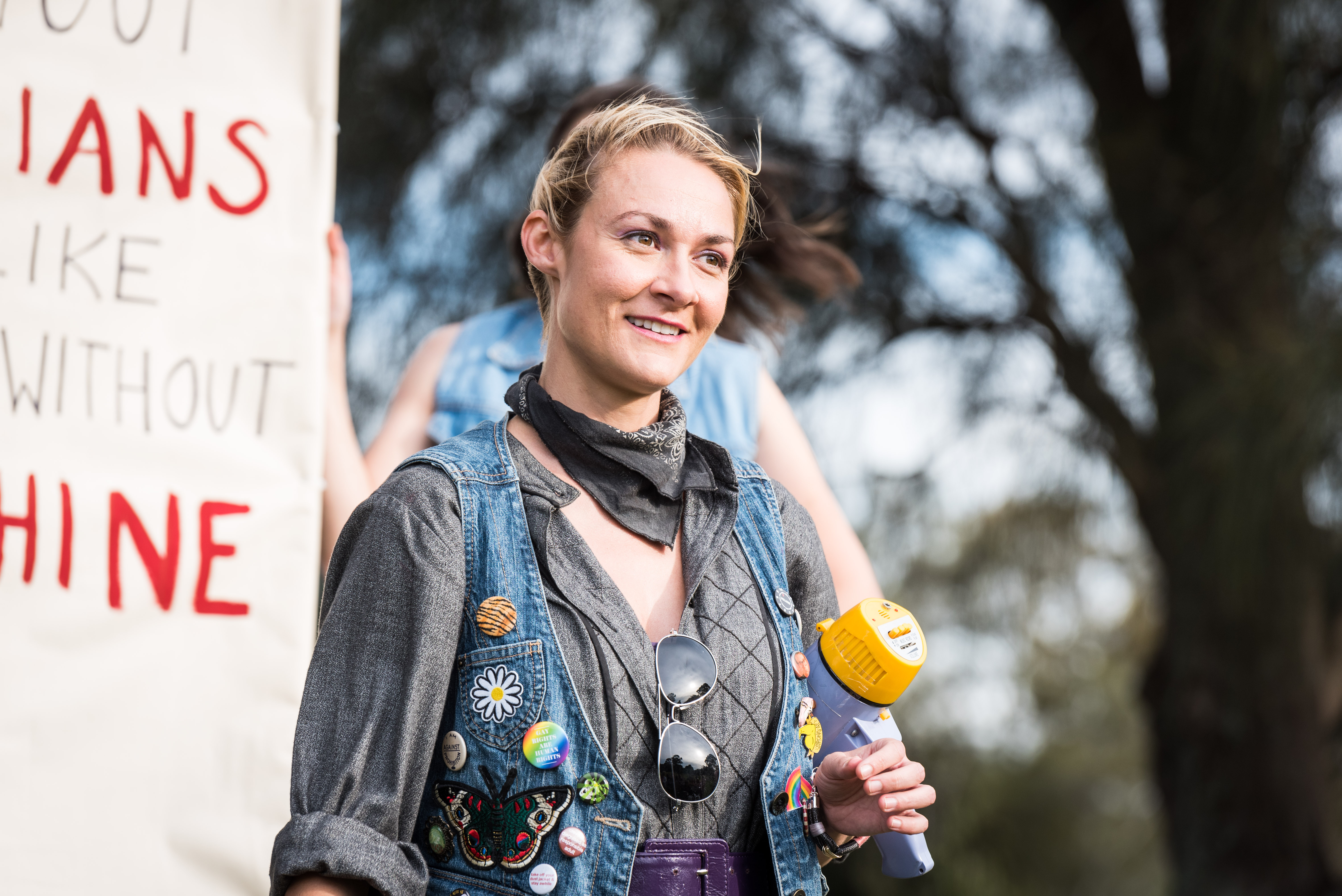
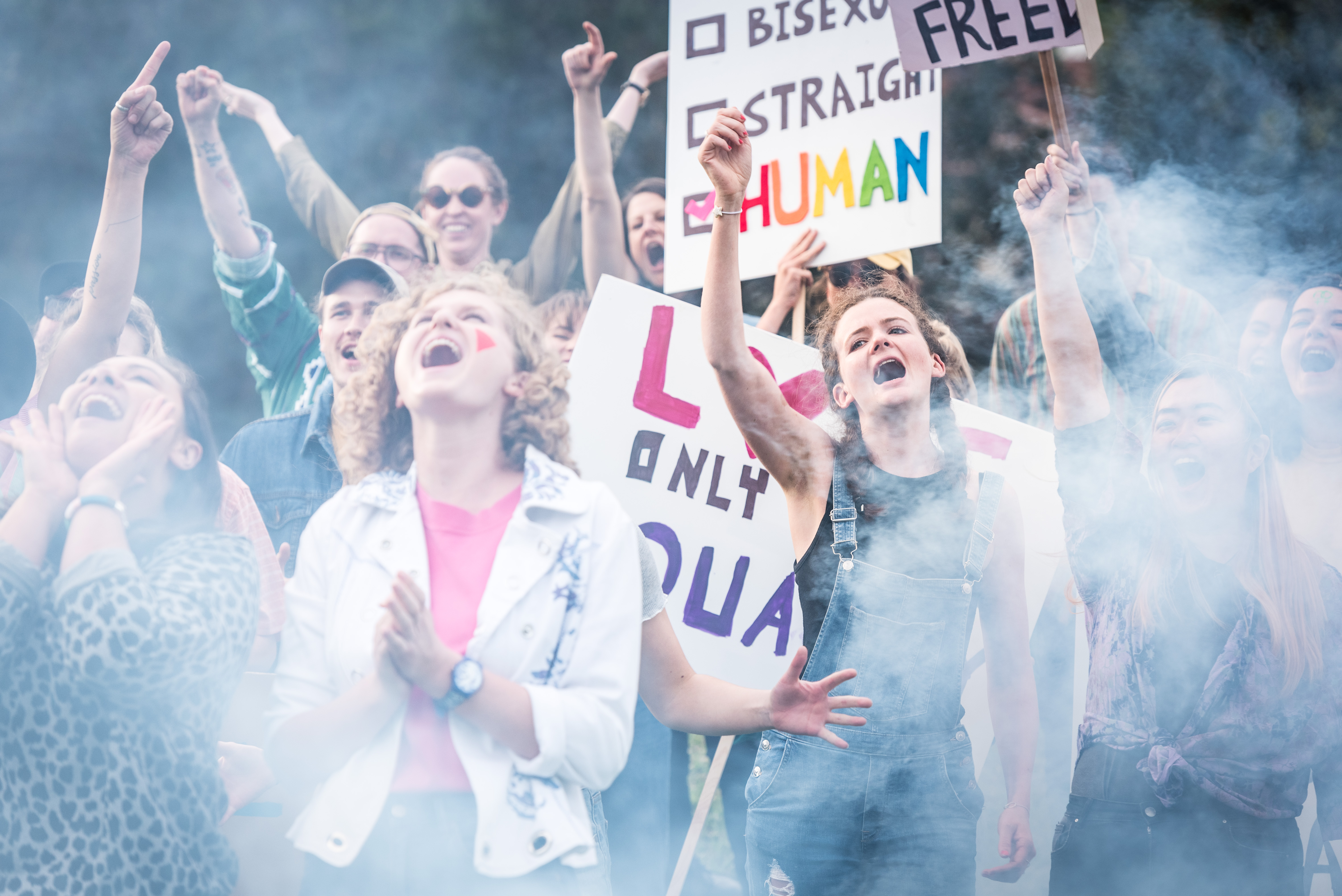
“I really wanted to make a queer family film, a film that could sit in a family category that was very important to me."
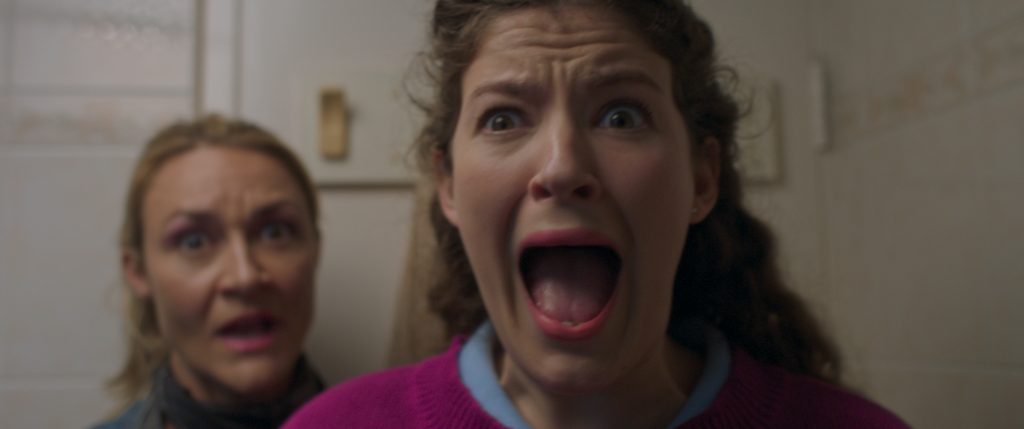
We’ve got this wonderful character of the Fairy Godmother, can you tell us a little bit more about her because she is a wonderful character and through her Ellie sees the plight that LGBTQ communities have been through and it hasn’t always been socially acceptable.
Hmm, yeah it’s such a fun way to kind of tell that story isn’t it? To have someone who is dead (laughs) and who has come back from the dead like a Fairy Godmother ghost. It a genre of storytelling that I have always loved is the fish out of water, like someone in the wrong world that they’re not meant to be in and trying to figure out the world, I think that’s just delightful comedy. And it did feel like a kind of different way to talk about these kinds of things. She does represent, you know a large group of people that did fight for our rights and it’s a very important story to tell, and very important person to represent. But I just thought that this could be a fun way to tell that story is to have her comeback and try and put her knowledge, her very well earned knowledge from the 80s onto her niece, which she is so happy to do and so proud to be doing it and then when Ellie just doesn’t want it (laughs) or just kind of seems to ruin Ellie’s life, ah it’s just a classic wonderful conundrum (laughs).
It is and you always need conflict and that is it. And what you’ve got as well is this wonderful ensemble of actresses that are able to inhabit breathe life and take these characters to the next dimension don’t you?
Yeah, we had a pretty incredible cast so I think it is mostly, I don’t know the exact percentage, a very high female cast, one non-binary actor and then some lovely men who were kind enough to take up the supporting roles in the background. Which isn’t something that I necessarily set out to do, I kinda wrote the script as I would see it and it wasn’t until a producer who didn’t; we decided not to work together, but he read the script and said, ‘This feels like a dystopian world with no men.’ I was like, ‘OK’ one: you shouldn’t make the film. And two: I didn’t even notice. It just goes to show how different. I was like it’s ‘not a wrong world, I just have a different lens to you, this is what we talk about when we talk about seeing the world through different people’s eyes and you know if you were a gay, lesbian teenager growing up who didn’t have a father, there’s not a lot of men in your life, they are your teachers, they are some of your class mates and that’s around it, if that’s not a place that your life is engrossed. Not every teenage girl is boy crazy and when you are not that girl it’s a very different way to look at the world.’ So it was great to write those characters but then yes, getting the cast right and getting the actors in to play them, I just got very, very lucky with my incredible cast.
Well you’ve made a really good point and I think what you have hit on is that there’s a dilemma for all filmmakers at the moment, writers, filmmakers in the respect that we should be writing good stories and yes there should be inclusivity, but the story has to come first doesn’t it? And when you are writing scripts you can’t necessarily tick boxes?
I think you can tell when you read a script and it’s been box ticked, you know. I think you can tell when people have added diversity in a panic (laughs). Which is why we need to have more people not just being cast, but people behind the scenes, the people creating the stories, people directing the stories, ‘cause they already see the world in that way and that’s where we get true diversity on screen and true inclusion on screen and yeah, it’s a pretty exciting time I have to say.
Yeah it is, and with Ellie & Abbie you’ve got a representational cast haven’t you?
Yes, we have a very representative cast. I fought very hard that I wanted the cast to be at least 50%, at the time, at least 50% which doesn’t feel to big now but that was in 2018 when I was pitching this film and I was like, ‘it’s got to have at least 50% LGBT identifying actors,’ and what a huge thing that was for people to think about and consider. And whereas now if I was to go onto my next project and do it again I’d fight, you know, ‘no I’m going for 100%’ because it’s important to me and I wanna fight for that and so I am very proud of the cast that we do have in this film, it’s one of my favourite things.
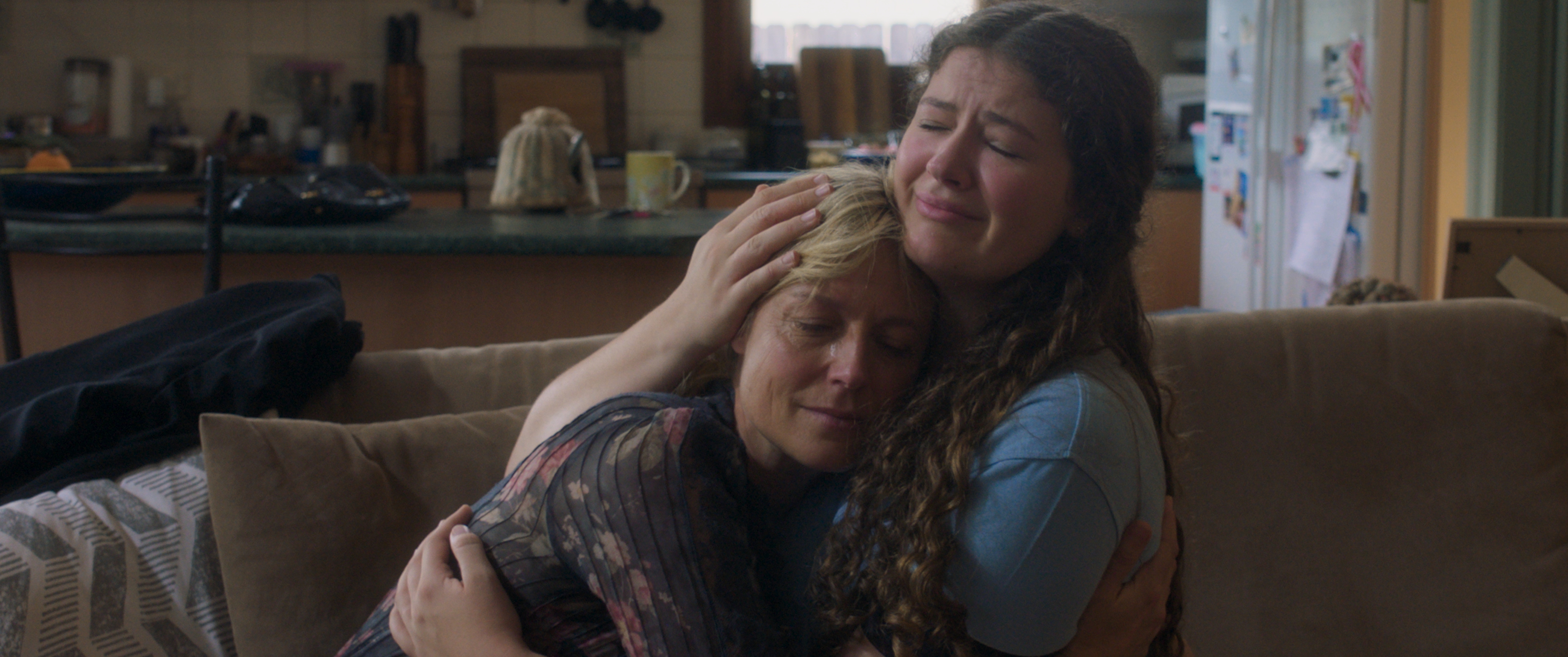
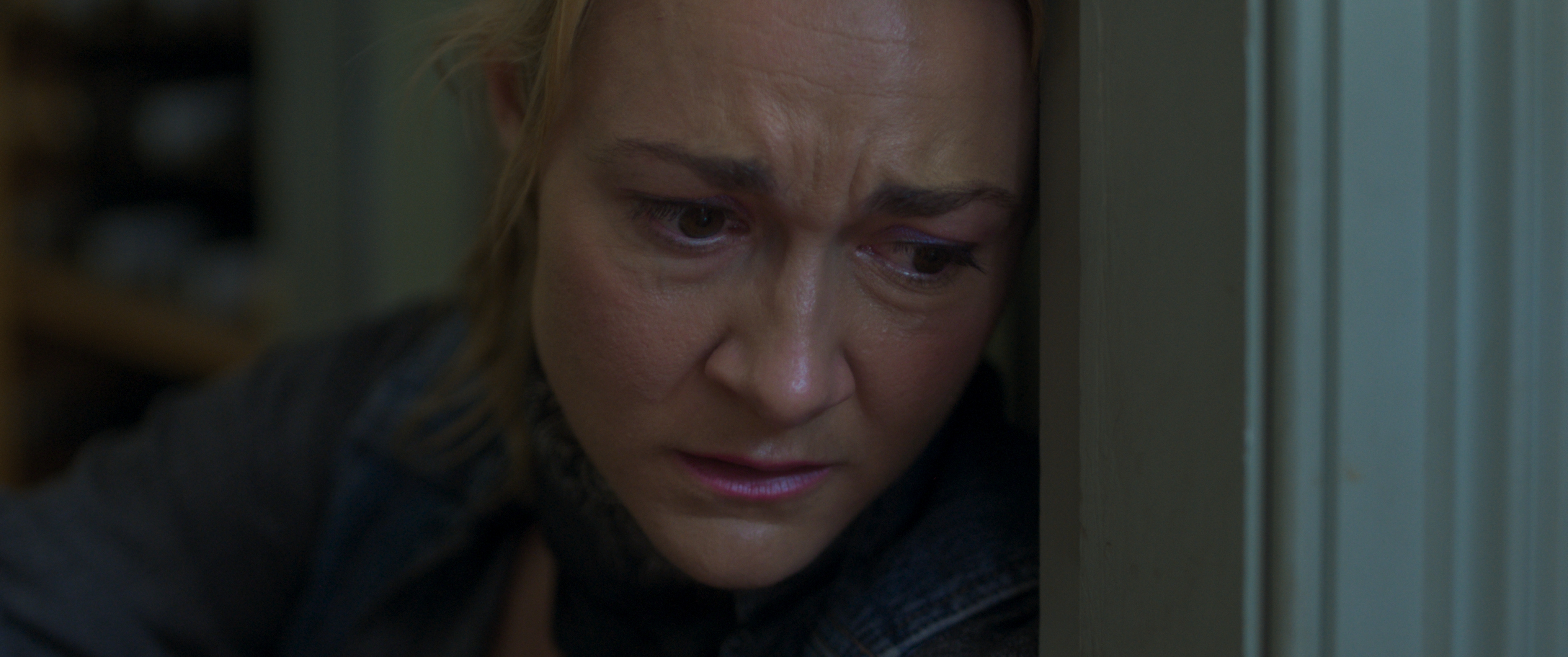
And interestingly enough you mentioned about pitching your film, so as an independent filmmaker, how do you then get it funded and then how do you begin pitching your idea, to enable you to make it and afford to make it?
Well, I had a feeling I was going to have a bit of trouble making it the way I want to make it. So I always had crowdfunding in the back of my mind. And also I had made an independent film before and I know how hard it was to get it up, it was very long and hard process and I wasn’t sure if I had that process in me again. So at first we made this film as a play because it was something I could do in an independent space, I could control it, I didn’t need anyone to say yes. I can hire a theatre, yes get on a bill at a theatre company which we did, and a very small theatre company in Sydney and we just did a two week run, but it was such as success, the run, and so many people just saw through me, they were just like, ‘you want to try this as a film and you’ve written it as a play and you should just make the film.’ I was like, ‘no it was play all along.’ And they were like, ‘that had like 55 scenes in it, it was a film, plays don’t have scene changes like that,’ (laughs). And so I decided to try writing the film and I did, and then had a little bit of the experience of pitching of trying to get it completely funded from the beginning and then it became very clear that my idea for the cast was going to be a problem for a lot of people, because they couldn’t see what I could see. You know they were like, ‘you’ve got to get a big name in there.’ And I was like, ‘well these are really great actors, really respected within the community and with great credits.’ And they’re like, ‘yeah, but is it Cate Blanchett?’ I was like, ‘Well no, but of course not, but we can’t always cast Cate Blanchett,’ (laughs). ‘She’s amazing, but she’s also busy.’ And so I decided to crowd fund, so I went straight to the community and made a little teaser and then put it out there and just basically said, ‘I really wanna make this film, if you want to help us make this film that would be great.’ And so we crowd funded and then raised a portion of the money and I used that portion to shoot it. So I shot the whole thing for what we raised in crowd funding and then from there I had something that I could show people and I think we finished filming one day and then three days later I got on a plane and went to Cannes Film Festival with a little teaser that me and my editor had cut in those two to three days, and I just met with anyone who would meet with me, ‘cause I was like we need a distributor, we need money to finish it, and these are the things we really need and I just went and met with everyone. And it was the last Cannes Film Festival that we’ve had, we’ve not had one since then because it was 2019. You know I was completely sick going to all these meetings ‘cause I’d just finished a film shoot, all these things, you could never do that now, you can’t go anywhere if you’re sick now, (laughs). And yeah basically came home with post-production partners and some post-productions funding so it was a very successful trip. So it really was a matter of like, if I believed, if I build this they will come and that very luckily is how it ended up.
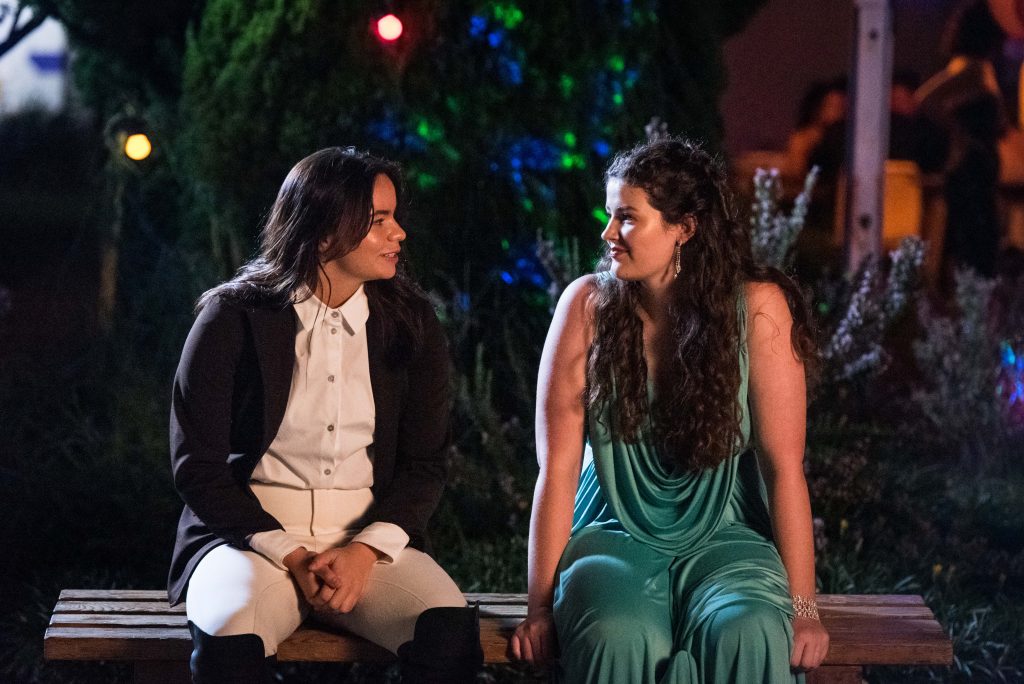
And think there’s a very important message that you’re just saying there as well Monica is that you had a very definite idea of how you wanted your film and you can’t allow yourself to compromise. As creatives we have a vision and we have an artistry and we’re not wanting to compromise on that. And I think when you start to enter into the world business and producers who money people, they don’t necessarily see your vision, for them it’s can I get a return back on my investment, it takes a lot of guts to say actually, “No, this is my vision and I’m gonna stick with it and see it through to the end how I want to do it.” And I think the message that you’re say there is that you can’t compromise, if you’ve got a vision of your story you have to stay faithful to it don’t you?
Yeah, it’s just those small things that we can control and the end of the day we have no control in this industry it is taken from you so quickly and you know there are people who will have a say because they are putting in money, or they’re important and so you’re often making compromises all over the place and I think it’s about knowing like, what moves the needle for you, what for you is too far, I cannot give you that and being able to fight for that. And the consequences of having to fight for that, for me the payoff was that I would have to do a huge bulk of the work myself before I could get the extra money and that was just the way it had to be in this particular case. I think if I was making it now it would probably be a bit different, but it’s amazing two years ago like, how much has changed. But yeah, it is something that I am very proud of, I’m so proud of the cast that we have and the film that we have and I can’t imagine it with anyone else, even Cate Blanchett.
Tip for the Filmmaker - before you make your film!
And finally, what advice you would give to yourself, what have you learned and what would you advise somebody else to go out and write and direct their feature?
I think knowing why you are writing this story and why you are making it, that’s so important. I think it’s a project that you have to push up hill yourself for years to come you need to know, particularly if you are going to do things like crowdfunding and raising money that kind of way which is very hard to do. It’s always hard to make a film no matter how hard you do it, but it’s really hard. And if it’s something that you feel lukewarm about, if it’s something that I should do this because it’s a good idea, it makes logistical sense or career sense for me to do this. You know with these passion projects that’s usually not enough because it will take over your life and you’ve got to know exactly why you’re doing it, exactly what you want out of it and you know, is this something I can give three years of my life to, to get up. And if the answer is absolutely I couldn’t think of doing anything else, then yeah you should go for it. And also that I think that I have crowdfunded twice now and actually think it is not a terrible way to make a film (laughs), it gets a bad rap but I actually think it is pretty good. I wouldn’t do it again, I’ve done it twice, but if you are thinking about doing it you should absolutely do it.
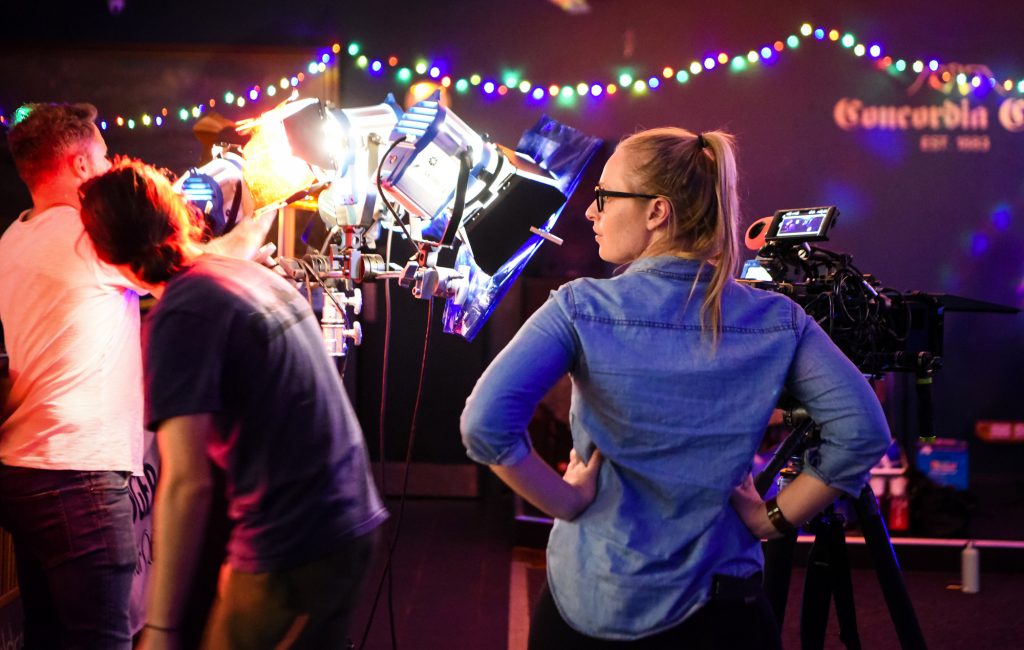
Ellie & Abbie (& Ellie's Dead Aunt) - Official Trailer
Claire Bueno
Claire Bueno is a film journalist, presenter and interviewer, having moderated BAFTA, Royal Television Society (RTS), Women in Film and Television (WFTV), and Apple Store Q&As and hosted Comic Con panel talks. Claire is the founder of Premiere Scene Magazine and has had the privilege of interviewing esteemed artists including Tom Cruise, George Clooney, Brad Pitt, Sir Anthony Hopkins, Sigourney Weaver, Emily Blunt, Samuel L Jackson, James Cameron and Andy Serkis.
As a media coach Claire works with leading personal publicists, HBO, Netflix, Sky, ITV, Penguin Random House, the BFI, DDA, MacMillan and Premier, offering practical coaching sessions and safe environment for talent to perfect their interview technique before facing the press. She has extensive experience working with emerging and seasoned professionals and where English is not their first language.
Additionally, Claire is the producer of the critically acclaimed feature documentary CLEANIN’ UP THE TOWN: Remembering Ghostbusters and the upcoming TOO HOT TO HANDLE: Remembering Ghostbusters II.